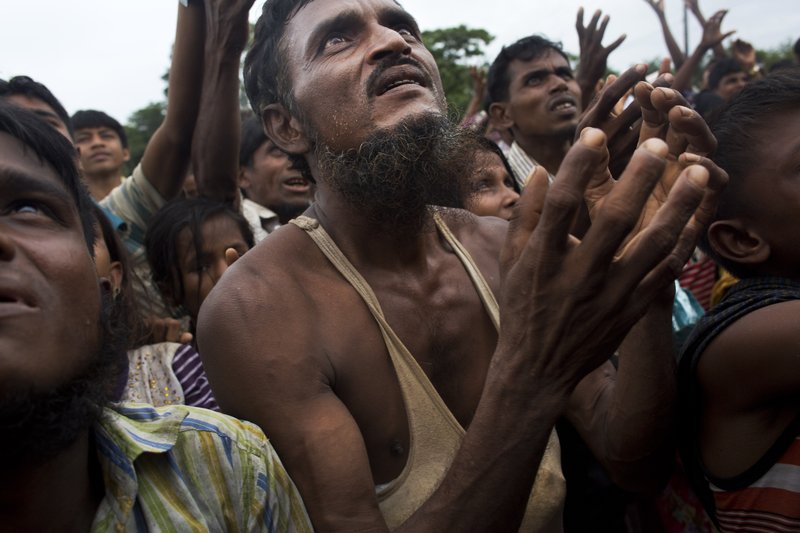COX'S BAZAR, Bangladesh -- The United Nations' top human-rights official on Monday accused Burma of carrying out "a textbook example of ethnic cleansing" against the Rohingya.
The same day, Bangladesh agreed to find space for a new camp to shelter some of the hundreds of thousands of Rohingya Muslims who have fled the violence in Burma.
Zeid Ra'ad al-Hussein, U.N. high commissioner for human rights, said the military's "brutal" security campaign was in clear violation of international law, and cited what he called refugees' consistent accounts of widespread extrajudicial killings, rape and other atrocities.
Al-Hussein said the crackdown "resembles a cynical ploy to forcibly transfer large numbers of people without possibility of return," noting that Burma had progressively stripped its Rohingya minority of civil and political rights for decades.
"The situation seems a textbook example of ethnic cleansing," he said in a keynote address before the U.N. Human Rights Council in Geneva.
The new camp will help relieve some pressure on existing settlements in the Bangladeshi border district of Cox's Bazar, where 313,000 have arrived since Aug. 25, according to the U.N.
"The two refugees camps we are in are beyond overcrowded," said U.N. refugee agency spokesman Vivian Tan.
Other new arrivals were being sheltered in schools, or were huddling in makeshift settlements with no toilets along roadsides and in open fields. Basic resources were scarce, including food, clean water and medical aid.
Still, more refugees were arriving. An Associated Press reporter witnessed hundreds streaming through the border at Shah Puri Dwip on Monday.
"Tomorrow we are expecting an airlift of relief supplies for 20,000 people," Tan said.
Prime Minister Sheikh Hasina offered 2,000 acres near the existing camp of Kutupalong "to build temporary shelters for the Rohingya newcomers," according to a Facebook post Monday by Mohammed Shahriar Alam, a junior minister for foreign affairs.
He also said the government would begin fingerprinting and registering the new arrivals on Monday. Hasina is scheduled to visit Rohingya refugees today.
Aid agencies have been overwhelmed by the influx of Rohingya, many of whom are arriving hungry and traumatized after walking days through jungles or packing into rickety wooden boats in search of safety in Bangladesh.
On Monday, Bangladesh's human-rights agency demanded that atrocities by Burmese authorities against Rohingya be prosecuted.
"This genocide needs to be tried at international court," National Human Rights Commission Chairman Kazi Reazul Haque told a news conference in Cox's Bazar.
"The killing, arson, torture and rape ... by the Myanmar's military and border guards is unprecedented," he said, using the name for Burma adopted by military authorities in 1989. Some nations, such as the United States and Britain, have refused to adopt the name change.
He said stronger action was needed from the international community, including the U.N., the Organization of Islamic Cooperation and the Association of Southeast Asian Nations.
He also called on China and India to play a larger role in mitigating the crisis.
The violence and exodus began Aug. 25 when Rohingya insurgents attacked Burmese police and paramilitary posts in what they said was an effort to protect their ethnic minority from persecution by security forces in the majority Buddhist country.
In response, the military unleashed what it called "clearance operations" to root out the insurgents. Accounts from refugees show Burma's military is also targeting civilians with shootings and wholesale burning of Rohingya villages in an apparent attempt to purge Rakhine state of Muslims.
Some officials in Burma have said that Rohingya set fire to their own homes and villages. On Monday, al-Hussein called such accusations a "complete denial of reality" that was damaging the international standing of a leadership that had benefited from considerable good will as the country emerged from decades of military rule.
Before Aug. 25, Bangladesh had already been housing more than 100,000 Rohingya who had arrived after bloody anti-Muslim rioting in 2012 or amid earlier persecution drives in Burma.
Rohingya have faced decades of discrimination and persecution in Burma and are denied citizenship despite centuries-old roots in the Rakhine region. Burma denies Rohingya exist as an ethnic group and says those living in Rakhine are illegal migrants from Bangladesh.
Al-Hussein's comments added to mounting international criticism of the military's actions in Rakhine. Some of it has singled out Aung San Suu Kyi, the de facto leader of the elected civilian government, who was awarded the Nobel Peace Prize in 1991 for her resistance to the military dictatorship. Suu Kyi does not control Burma's military, but she has yet to criticize its crackdown on the Rohingya.
On Friday, the Dalai Lama became the latest Nobel Peace Prize laureate to raise the issue of her silence, after statements from Bishop Desmond Tutu of South Africa and the rights advocate Malala Yousafzai of Pakistan, both of whom called on Suu Kyi to take action.
The Dalai Lama said he felt "very sad" about the suffering of Rohingya Muslims, and that those harassing them "should remember Buddha. I think such circumstances Buddha would definitely help those poor Muslims."
Information for this article was contributed by Al-Emrun Garjon, Julhas Alam and Ashok Sharma of The Associated Press; and by Nick Cumming-Bruce of The New York Times.
A Section on 09/12/2017

